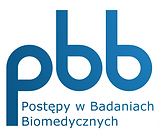IX Ogólnopolska Konferencja Postępy w Badaniach Biomedycznych

prof. Dariusz Górecki
School of Pharmacy and Biomedical Sciences
University of Portsmouth, UK
Profesor Górecki jest absolwentem naszej uczelni i pracuje na Uniwersytecie w Portsmouth UK jako Dyrektor ds. Badań Naukowych w Szkole Farmacji i Nauk Biomedycznych i kierownik Laboratorium Medycyny Molekularnej. Główne zainteresowania badawcze profesora Góreckiego to patogeneza dystrofii mięśniowej Duchenne'a z uwzglednieniem receptorów purynergicznych oraz rola kompleksu dystrofiny w mózgu. Laureat kilku prestiżowych stypendiów w tym stypendium Fullbrighta (Distinguished Fulbright Scholar). Aktualnie współpracuje z WUM w zakresie prowadzonego wspólnie projektu badawczego.
Temat wykładu/Lecture:
P2RX7 – the Prince and the Pauper of therapeutic targets.
Abstract:
The P2RX7 receptor is a unique member of a family of extracellular ATP (eATP)-gated ion channels expressed in immune cells, where its activation triggers the inflammatory cascade. P2RX7 signalling has also been documented in other physiological and pathological processes including pain, CNS and psychiatric disorders and cancer. However, several unanswered questions have been limiting the development of P2RX7 therapies. Firstly, this receptor functions as an ion channel, but its chronic stimulation by high eATP causes opening of the non-selective large pore (LP), which can trigger cell death. How can tumour cells take advantage of P2RX7 for growth and spread and yet survive overexpression of potentially cytotoxic LP in the eATP-rich environment? The recent discovery of the feedback loop, wherein the LP-evoked release of active MMP-2 triggers the receptor cleavage, provided one explanation. Another mechanism might be that of cancer cells expressing a structurally altered P2RX7 receptor, devoid of the LP function. Exploiting such mechanisms should lead to the development of new, less toxic treatments. The recent advances in our understanding of molecular mechanisms of P2RX7 activation and inhibition, which cause its re-emergence as an important therapeutic target will be discussed.
